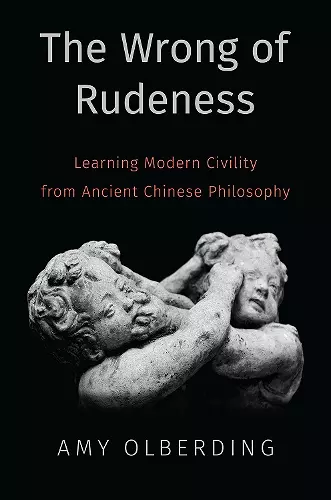The Wrong of Rudeness
Learning Modern Civility from Ancient Chinese Philosophy
Format:Hardback
Publisher:Oxford University Press Inc
Published:26th Sep '19
Currently unavailable, and unfortunately no date known when it will be back

In a time of fractious politics, being rude can feel wickedly gratifying, while being polite can feel simple-minded or willfully naïve. Do manners and civility even matter now? Is it worthwhile to make the effort to be polite? When rudeness has become routine and commonplace, why bother? When so much of public and social life with others is painful and bitterly acrimonious, why should anyone be polite? As Amy Olberding argues, civility and ordinary politeness are linked both to big values, such as respect and consideration, and to the fundamentally social nature of human beings. Being polite is not just a nicety--it has deep meaning. Olberding explores the often overwhelming temptations to incivility and rudeness, and the ways that they must and can be resisted. Drawing on the wisdom of early Chinese philosophers who lived through great political turmoil but nonetheless avidly sought to "mind their manners," the book articulates a way of thinking about politeness that is distinctively social. We can feel profoundly alienated from others, and others can sometimes be truly terrible, yet, as the Confucian philosophers encourage us to see, because we are social, neglecting the social and political courtesies comes at perilous cost. The book considers not simply why civility and politeness are important, but how. It reveals how small insults can accumulate to damage social relations, how separating people into tribes undermines our better interests, and how even bodily and facial expressions can influence our lives with others. Many of us, in spite of our best efforts, are often tempted to be rude, and will find here tools for fighting that temptation.
...I found the book a most enjoyable read and would recommend it to readers who want to learn about Confucianism and the Confucian fascination with manners. The book is also a must to those who are — like myself — intrigued about the human motivation to be civil and rude. * Dániel Z. Kádár, Dalian University of Foreign Languages, China Review International *
this is clearly a book for the times. It challenges the reader to reflect more carefully on the costs of tribalism and incivility, at a time when reasonable people are increasingly tempted by them. This richly imaginative exercise in renewing civic life deserves the widest possible audience. * Andrew Lambert, Notre Dame Philosophical Reviews *
The book is deeply humane, surprisingly inspiring, and sprinkled with a gentle humor, all of which make for delightfully edifying reading. Olberding doesn't dazzle with lofty ideals, although there are lofty ideals of humanity and sociability that guide the book. Instead, drawing on everyday experiences, she patiently reveals the deep attractions of doing the hard work to cultivate civil and mannerly habits, of following seemingly trivial rules of etiquette, and of resisting the temptations to rudeness or indifference that beset our rattier selves. This is a beautiful book about the importance of our shared struggle to sustain human connection. * Cheshire Calhoun, Trustee Professor of Philosophy, Arizona State University, and author of Moral Aims: Essays on the Importance of Getting it Right and Practicing Morality with Others *
"In this deeply personal book, philosopher Amy Olberding brilliantly shows how ancient Confucians can help us to grasp the centrality of manners and civility to good lives today. The Wrongness of Rudeness has important lessons for anyone who has ever struggled to be polite -- or wondered whether it's worth the bother." -- Stephen C. Angle, Mansfield Freeman Professor of East Asian Studies, Wesleyan University
ISBN: 9780190880965
Dimensions: 145mm x 211mm x 23mm
Weight: 318g
198 pages